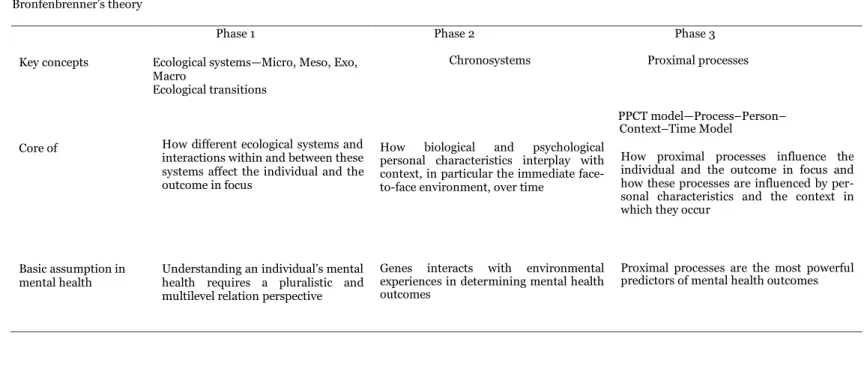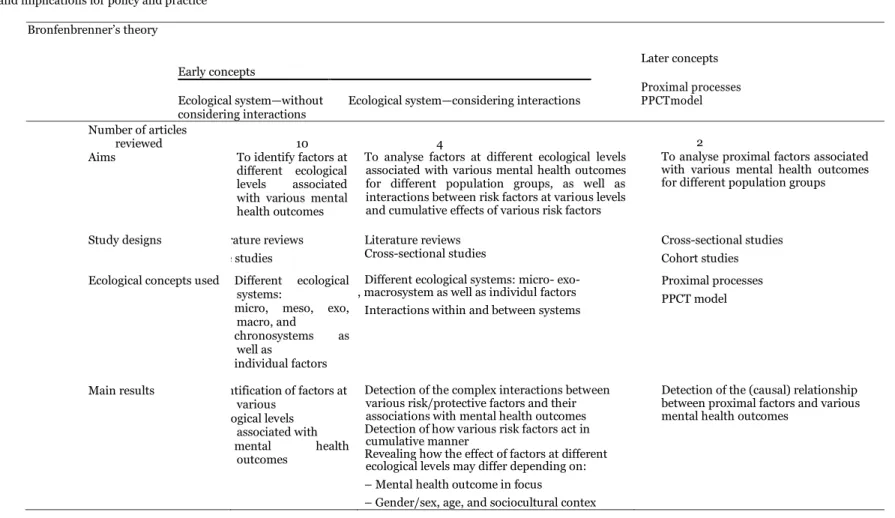The WHO calls the violent conditions to which people with mental disorders are exposed a hidden human rights emergency. Therefore, population mental health stakeholders, including the government, international agencies, non-governmental organizations, the private sector, health professionals, social organizations, the community, academics and researchers, all have yet to pay more attention and exert their efforts to address the current and growing mental health challenges. The 5th ICPH seeks to address issues of how to prevent mental illness in communities and improve population mental health by implementing urgently needed social and economic policies that address inequality, by creating supportive social environments, and by ensuring access to appropriate, high-quality mental health services.
Different uses of Bronfenbrenner's ecological theory in public mental health research: What is their value? Effect of aggressive behavior of the schizophrenic patients on the level of stress of mental health nurses at Southeast Sulawesi.
HEALTH PROMOTION AND BEHAVIOR Path Analysis on the Factors Associated with Mobile VCT of HIV
Effect of health promotion media on HIV/AIDS control and prevention behavior among church youth in Timor Tengah Utara,. The effect of family support on people with mental disorder in Sungai Besar Community Health Center, Banjarbaru, South Cali-. Wahyu N, Firdaus Wahyudi, Suharto, Dodik Pramono SUBJECT III: MATERNAL AND CHILD HEALTH The effect of exclusive breastfeeding on underweight in children.
Effect of the integrated health post and other factors on the risk of developmental disorder among children under five in Kubu Raya,. Effect of flip board health education on the practice of exclusive breastfeeding among lactating mothers at Kobakma.
HEALTH POLICY AND MANAGEMENT Factors Associated with the Patient Satisfaction of Health Care Ser-
Traditional vs. Positive Mental Health Models
Traditional mental health diagnoses generally use the Negative Psychopathology Indicator (PTH) and adopt the Diagnostic and Statistical Manual of Mental Disorders (DSM) as the standard for psychological diagnoses. Rather than the absence of mental illness, mental health refers to the presence of positive characteristics. However, from a broader perspective, the Dual-Factor Model of Mental Health emphasizes that mental health is not the absence of mental illness or high SWB, but a complete state that integrates the absence of mental illness and high SWB (Wang et al. , 2011).
The Dual-Factor Model of Mental Health emphasizes that mental health is a complete condition aimed at overcoming clinical shortcomings in traditional healthcare. It changes the one-dimensional model (there is/is no mental illness) and is a self-improvement in the field of mental health research (Wang et al., 2011).
Mental Disorders, Stigma, and Human Rights
The poor often bear the greater burden of mental disorders, both in terms of the risk of having a mental disorder and the lack of access to treatment. Constant exposure to severe stressful events, dangerous living conditions, exploitation and poor health in general all contribute to the greater vulnerability of the poor (WHO, 2001). For example, "pasung", an Indonesian term that refers to childbirth for people with mental illness, continues to exist terribly in Indonesia.
Due to lack of education and wrong belief, mental illness is sometimes considered as a punishment from the Almighty (Azeem, 2013). According to a study, the main reason for increasing the practice of pasung in Indonesia refers to the lack of government interest in this issue, and therefore a large part of the disease burden is borne by the affected families and communities.
Prevention and Treatment of Mental Health
DFM emphasizes positive prevention and advocates the use of the previously mentioned two-dimensional (PTH and SWB) classification standard to determine which individual needs improvement of SWB to actively prevent mental illness and which individual needs intervention, especially to identify the imperfectly mentally healthy group and those who suffer for incomplete mental illness, in order to effectively solve the problem that the traditional one-dimensional PTH indicator system excludes incomplete mental health from prevention and intervention, and that such prevention and intervention would be more specific and better targeted (Suld dan Shaffer, 2008).
Investment in Mental Health
Therefore, it is not surprising that many effective preventive measures are aligned with the principles of social equality, equal opportunities and concern for the most vulnerable groups in society (WHO, 2004). Many of these interventions are worthwhile in their own right, although the evidence for their effectiveness in preventing certain mental disorders is sometimes weak (WHO, 2004). As Benedetto Saraceno, Director of the Division of Mental Health and Substance Abuse at the World Health Organization in Geneva, warns, we must not allow the search for further scientific evidence of effectiveness and cost-effectiveness to become an excuse for not implementing urgently needed social and health policies.
These methods should incorporate qualitative techniques drawn from the social, anthropological and other human sciences and stakeholder analysis to capture the complexity and diversity of outcomes (WHO, 2004). One model that has been developed to promote positive mental health in the population is to support a thriving, resilient and healthy community that cares for each other, research and discuss mental health and well-being, use quality resources when needed, and realizing the positive potential for mental health together.
Summary
A logic model for integrating mental health into chronic disease prevention and health promotion. To outline policies and priorities for ensuring equity of access to primary mental health and well-being. To discuss health promotion strategies to address health issues among Indonesians related to mental health and well-being‖.
Discuss strategies to improve the recruitment and retention of qualified and motivated mental health and wellbeing staff (including education, legislation, finance and incentives, support for personal and professional development). Abstracts include but are not limited to the current ICPH theme "Promoting Population Mental Health and Well-Being".
Workshop (Day 2)
With the help of mental health professionals, population health professionals, academics and researchers, workshop participants learn different strategies and approaches to prevent mental health illnesses and improve the mental health of the population. Workshop participants learn how to correct mental illnesses and disorders with appropriate interventions at the individual, family, and population levels. At the workshop, participants also update their skills on how to conduct research in mental health issues, how to design and analyze data, and how to publish research papers internationally in high-reputation journals. This program provides an opportunity for all participants to present their research work in an oral presentation format.
Participants are expected to email abstracts in English or Indonesian with correct grammar, sentence structure and standard abstract format (background, subject and methods, results and conclusion) to the ICPH Secretariat. The ICPH committee will verify the relevance of each abstract and review the relevance and scientific significance of the abstract. The usual duration of each oral presentation is 10 minutes with 5 minutes of discussion/question and answer.
It covers information about time of presentation, abstract title, name of author (and co-authors) and presentation room. Oral presentation is done on Day 2 of the conference, parallel to the workshop sessions. The collection of abstracts is published in the ICPH Proceedings 2019 with a Digital Object Identifier (DOI) assigned to each abstract.
The proceedings are published in printed form and distributed to the participants, as well as uploaded online on the ICPH website at www.theicph.com. The printed ICPH proceedings, usually on glossy paper, are distributed to the participants on Day 1 of the conference at no extra cost just before the symposium begins, and are placed in the seminar kit. After completion of the conference, authors of the accepted abstracts for oral or poster presentation may wish to submit and publish their full papers in one of the international open access peer-reviewed journals managed by the Master.
Oral Presentation
Entrants with research work in any branch of public health are encouraged to submit their abstracts online or by email, particularly those abstracts of original research addressing rural and remote health issues. Entrants with research work in any branch of the public health field are encouraged to submit their abstracts online or by email, particularly those abstracts of original research addressing rural and remote health issues. Authors of the poster presentation are required to email abstracts in either English or Indonesian language with appropriate grammar, sentence structure and standard abstract format (background, topic and methods, results and conclusion) to the ICPH Secretariat.
The ICPH committee will do the remaining work, including poster printing and poster mounting on the stand. The branches of public health on which the participants can submit their abstracts for poster presentation include, but are not limited to, the following:. Chairman of the Advisory Board, Indonesian Association of Public Health Workers (Ikatan Ahli Kesehatan Masyarakat Indonesia/IAKMI).
Empowering the community to stop ―Pasung‖. Confinement) of the mentally ill. Faculty of Nursing, University of Indonesia, Jakarta, Indonesia). One health for people and the planet". Doctor and education in primary health care, specialization in public health and PhD in public policy. CSP Wekadigunawan, Ph.D., MPH., Ph.D. Development of a community mental health center in the city of Solo to improve mental health promotion and prevention.
Professor Joanna Nurse (UK) Prof. CSP Wekadigunawan, Ph.D., MPH., Ph.D. Effective interventions for medium- and long-term reduction of mental health-related stigma and discrimination. Doctor and education in primary health care, specialization in public health and PhD in public policy.
Different uses of
Bronfenbrenner’s ecological theory in public mental health
Strategies to Manage Online Gaming Addiction at Home
- Set a password or an application lock
- Allow some family time on daily basis
- Avoid the habit of using the internet for fun
- Take your children out to where your family can enjoy the beauty of nature Spending family time for a nature walk can be made a very positive regular
- Ask your children to join a comprehensive soft-skill program
- Try a combination of hypnotherapy and spiritual EFT
This study aimed to determine the effect of socio-economic factor on the incidence of diarrhoea. The 5th International Conference on Public Health FACTORS ASSOCIATED WITH THE RISK OF ACUTE RESPIRATORY. This study aimed to determine factors associated with the risk of hypertension among civil servants in Central Sulawesi.
Background: Dengue is an important mosquito-borne disease in terms of morbidity, mortality and economic costs. The factors responsible for the incidence of dengue hemorrhagic fever (DHF) are complex, including socio-demographic and environmental factors. The aim of this study was to identify factors associated with the risk of diarrhea in children under five years of age in Bandung, West Java. This study aimed to systematically review the determinants of quality of life in older people with depression.
This study aimed to investigate the effect of celery juice on blood pressure among hypertensive patients. A sample of 24 patients with systolic hypertension was selected for this study by simple random sampling.

